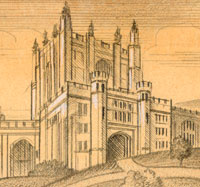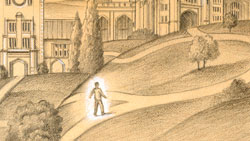My Vassar Education
Henry Noble MacCracken Professor of English Robert DeMaria delivered this year’s Fall Convocation address to a packed chapel. Present in especially high numbers were the freshmen, charged by DeMaria in his ironic and satirical speech “My Vassar Education” to beware of their own Vassar education and the kind of passion for lifelong learning it might awaken. Here’s an excerpt from his memorable and humorous speech.
For a scholar of eighteenth-century literature, giving a convocation address is a difficult assignment. A convocation address is usually a pretty earnest affair, whereas eighteenth-century literature, always suspicious of earnestness, delights in satire and irony.... The best convocation speeches... are supported by an original and genuine act of intellectual autobiography on the part of a revered speaker. But, it’s just such a presentation that studying the eighteenth century makes one suspicious of. The “revered speaker” in eighteenth-century literature often turns out to be a phony or a mask. Partly as a result of reading this literature for so long, I don’t trust anyone who tells me he or she has the answers to life, and I am too skeptical about general truths to preach them to you.
Moreover, I want to encourage a degree of skepticism in you, a distrust of pious know-it-alls, and some contempt for their cant or false wisdom. So this is how I will proceed: I will tell you the story of my Vassar education and I will include some general truths, but I want you to realize that these are the words of a somewhat untrustworthy character called the Convocation Speaker. Call me Professor DeMaria or, as some students used to, D+ DeMaria....
At the risk of sounding naïve about the nature of knowledge, I would say that when I arrived at Vassar at age twenty-six I knew almost nothing.... There weren’t many courses in the curriculum in those days, and they weren’t so specialized. As I was largely uneducated, I was of course thrown into teaching classes for which I was unprepared. But preparing for them was a great education…. One of the great things about Vassar students—and an indelible part of the culture in which you and I live—is that you keep your teachers on their mettle. You are inquiring, challenging, independent, and demanding. That’s part of your culture, and when you arrive here you inhale it along with the humid air of Poughkeepsie; you can’t help it. I have sometimes wished you would take it easy on me or other members of the faculty, but on the whole it’s your willingness to be challenging that has been the greatest pleasure in teaching here. (I am not now being ironic!) In fact, your challenging ways have been my best teacher. I would beg you to continue, but I know that it will happen spontaneously; it’s part of this very durable intellectual culture that we all are fortunate enough to find ourselves living in.

I started going to the library every day, and this was a crucial part of my Vassar education. I had never been a denizen of the library—my model was the writer in his lonely tower—but then I had never had a library as attractive as ours at hand. For a while I was reading literary criticism in the mornings in the old Lockwood wing of the library—there I was reading the latest deconstructionist writing in a piece of deconstructionist architecture—and then in the afternoons I was treating myself to Johnson’s Dictionary, which I thought was rather idle work. I thought my professional standing depended on the morning’s work—one should be up-to-date on the latest research, after all—but the afternoon pleasures overpowered me, and soon I was going to Special Collections as soon as it opened and staying till it closed. So enamored was I of reading this eighteenth-century book, that I persuaded the Special Collections librarian to lock me in during the lunch hour, so I didn’t have to lose a whole sixty minutes of reading. Fran Goudy, an old-fashioned bibliophile who wore homemade dresses with giraffes and other zoo animals on them, consented to this strange request, but she told everyone about it. I became something of a show, I think—I sometimes caught other librarians peering in on me....
About this time too I started studying Greek. A lot of the books Johnson read were in Latin and Greek, and to keep following in his footsteps I needed Greek. You can’t follow footsteps in translation. Luckily, the late James Day and other members of the classics department were willing to teach me, and I continued my Vassar education. I sat in on all the Greek classes, and, believe me, I was never the best student. Some of you were always better. But I may have appreciated James’ pedagogical skill more than anyone. I’ll never forget one rule of Greek grammar because James hollered it so loudly and brought his hand down so hard that he destroyed the desk he was sitting behind. There he was, after the explosion, sitting calmly, smoking a cigarette, as the desk collapsed in slow motion, revealing him at full length, right down to his open-toed sandals, with his words echoing before us: “There is No Augment outside the Indicative.” (That’s a fact about Greek grammar. It’s not a vague truth or a piece of cant.) Loving such a fact, I confess, proves I’m a drudge, but I urge you to love such facts, too. Loving this fact is akin to the feeling you get when you can read a passage of Homer in Greek or when you can accurately hear the tone of an English poem written three or four hundred years ago. It’s a transformative sensation; you feel you are a different person, a more expansive person, than you were before.
Between the Dictionary reading and the language study I was at this point (about age thirty) in a real frenzy about learning. I used to go running on the farm with a fistful of irregular Greek verbs in my pocket — shouting them out as I went. Once as I was shouting in Greek, the then Mayor of Poughkeepsie came running up behind me to find out if I was ok. I didn’t really think I could explain, so I muttered something, sped up, and ran away. I must have seemed very odd, but I was willing to seem odd, at least for a while, and it’s ok to seem so. It’s safe to seem a bit odd running madly after knowledge at Vassar, though it might not be so safe elsewhere....

There’s no guarantee, of course, that you will fall in love with learning while you’re an undergraduate these four short years. It didn’t happen to me until I was close to thirty years old. There’s also no guarantee, or even a likelihood, that you will want to explore the same kind of learning that I got hooked on. But, whether you know it yet or not, you’re living in a culture that rejects easy answers and fosters a true love of learning. It might get you while you’re here, or it might get you later, but the possibility is all around you. If you don’t want to end up a harmless drudge, Watch out! If you want to avoid the madness that has afflicted me, you must do certain things. First, stay away from the library; many a happy soul has wandered into those gothic halls a self-satisfied person conscious of his own omniscience and walked out filled with a horrible sense of his or her own ignorance. Be careful about listening too closely in class. Sometimes a casual observation by one of your teachers or one of your fellow students will accidentally spark the tinder of your mind it and set you on fire. The art gallery, the theater, and Skinner auditorium can be equally dangerous. You might become inspired there, which is literally to be inflated or blown up. Even if you stay away from those hallowed places, you might be caught unawares. Even those most devoted to intellectual sleep can be awakened in Vassar’s learned atmosphere. I have heard of students becoming afflicted with the desire to learn while walking on the path to the old observatory when the weather freshens in the fall, or even while observing the reflections on Sunset Lake. I suppose I don’t have to warn you about the new observatory where you might grow starry-eyed about learning, but avoid also, I warn you, all the sciences. The laboratory, as I’ve said, is the quintessential Vassar class. Even the gym is not safe: sports and exercise teach you about yourself and what is the end of learning but self-knowledge, as ancient wisdom tells us? One false step in sports and you might find yourself jogging on the farm with a fistful of Greek verbs in your hand. If you don’t want this to happen to you, be an indolent genius, sleep soundly, and confine yourself carefully to safe places.
But where can you find a safe place? The one and only place you may be safe from learning at Vassar might be right here, right now, listening to this soporific speech. While I drone on, you can sleep. But, beware, my speech now is over, and you are on your own in this dangerous place.
DeMaria has taught at Vassar since 1975. He is the author of several books about the great 18th-century lexicographer, essayist, and poet Samuel Johnson. His most recent publication is Classical Literature and Its Reception (Blackwell, 2007), an anthology of classical and modern works, edited in collaboration with Robert Brown of the department of classics.
